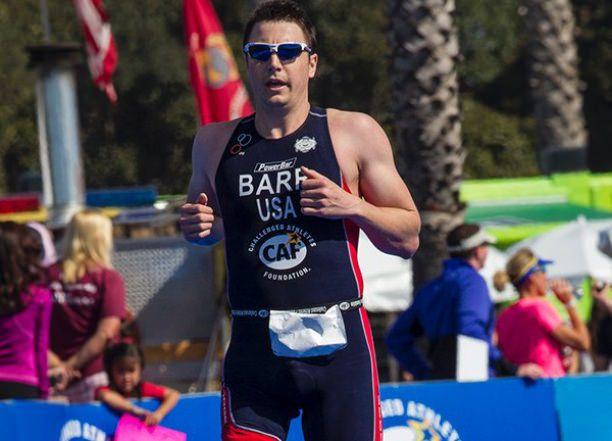USA’s Mark Barr seeks first Paralympic medal
09.09.2015The PT2 athlete can use his Paralympic swimming background as an advantage to reach the Rio 2016 podium.
 Mark Barr is the world number one in the men's PTS2 category
© • Paul Phillips/Competitive Image
Mark Barr is the world number one in the men's PTS2 category
© • Paul Phillips/Competitive Image
“It has been fun watching para-triathlon grow over the past four years and it is only going to get better over the next 12 months leading up to the Games.”
The USA’s Mark Barr has competed in two Paralympic Games. But Rio 2016, he hopes, would be his first time as a para-triathlete.
Currently ranked No. 2 in the men’s PT2 category, Barr competed in Athens 2004 and Beijing 2008 as a swimmer but never reached the podium. That may change in about a year’s time, when the Rio 2016 Paralympic Games begin and para-triathlon makes its debut.
“There [will be] something special about competing in the first ever para-triathlon event in the Paralympics,” he said.
At 14 years old, Barr, then an avid swimmer who also played football and baseball, developed a form of bone cancer called osteosarcoma in his leg. His treatment included a year of chemotherapy and lung surgery, and he had to get his right leg above the knee amputated.
While in recovery, one of his nurses, who herself was an amputee and Paralympian, introduced Barr to Paralympic swimming.
Over the next five years, Barr swam for the US Paralympic Swimming Team from 2003-2008 and collegiately for California Polytechnic State University. His best finish was a silver medal in the 100m butterfly S9at the World Championships in Durban, South Africa, in 2006.
After retiring from competitive swimming in 2008, Barr took up biking and running. The next year, he and wife Chelsea competed in their first triathlon together.
“In 2009, [we] signed up for our first triathlon and I did pretty well,” Barr said. “A friend told me to try and compete at the Para-Triathlon Nationals later that year in New York City, so I did and ended up winning. Needless to say, I have been hooked on the sport ever since.”
Currently ranked No. 2 in the world in the PT2 division, Barr attributes his quick and consistent top finishes to his swimming background.
“[Swimming] allowed me to develop a solid cardiac threshold, familiarity to intense training regimens, and racing in general,” Barr said.
In order to prepare for Rio 2016, Barr has spent the last year working with triathlon coach Mark Sortino.
“He [Sortino] has really done a great job providing structure and meaning to all of my workouts and racing schedule,” Barr said,
Even while working as a full-time registered nurse in the surgical intensive care unit, Barr makes time to train four to five hours each in biking and swimming, and one to two hours in running every week.
That training will be put to the test at the Para-Triathlon World Championships in Chicago, USA from18 September, which he and coach Sortino have dubbed as his “A” race for the year.
Barr will challenge top Rio contenders in Russia’s Vasily Egorov and Italy’s Michele Ferrarin of Italy.
“They are both very fast and it will take a near perfect race by an above-knee amputee like myself or [France’s] Stephane Bahier to beat someone who is not a prosthetic user,” Barr said. “Not saying that it cannot be done, but that it will require flawless execution from start to finish to get it done.”
Barr and Egorov last met at the Rio de Janeiro International Triathlon Union (ITU) World Para-Triathlon Event in August. The race was a test event for Rio 2016, with Barr finishing second to the current world No. 1.
“It has been fun watching para-triathlon grow over the past four years and it is only going to get better over the next 12 months leading up to the Games,” Barr said, “There is just an excitement and buzz around the sport right now and it is great to be a part of.”
Tickets for Rio 2016 Paralympic Games are now on sale to residents of Brazil. Overseas fans, meanwhile, should contact the authorised ticket resellers (ATRs) in their territories.



















